If you are wondering what to pack for Ireland in January, then you’ve come to the right place. With my local knowledge of Ireland in January, you will discover exactly what you need on your packing list for Ireland in January.
If you are going to be spending time during January in Ireland, then you might be wondering what to pack to ensure you are comfortable. January is a cold, wet, and windy month in Ireland with average daily temperatures of 7C/45F. Rain is a regular occurrence across the country, with the east generally being dried than the west.
When preparing for your January visit to the Emerald Isle, you need to be prepared and pack accordingly, and this is where this post comes in with details of what to pack for Ireland in January.
*This post contains affiliate links, which may include Amazon affiliate links. To read more about affiliate links, please visit my Disclosure Policy page.
What to Pack for Ireland in January
The main aim for any packing list for Ireland in January is warmth and weatherproof. While daytime temperatures average 7C, night-time temperatures average around 3C, with regular dips below freezing. So, layers and warm clothing are a must for this month.
Packing list for Ireland in January – Clothing
Weatherproof Clothing and Equipment
The biggest thing to consider for January in Ireland is warm and weatherproof clothing. This means winter coats and rain gear. This goes for the whole family, whether you are travelling to Ireland as a couple or with kids.
A heavy, warm winter coat is going to be a must. Down jackets and coats are a good choice for this month in January. They will provide all the warmth you will need for cold days and evenings. Ideally, for ladies, go for something that is longer for added comfort.
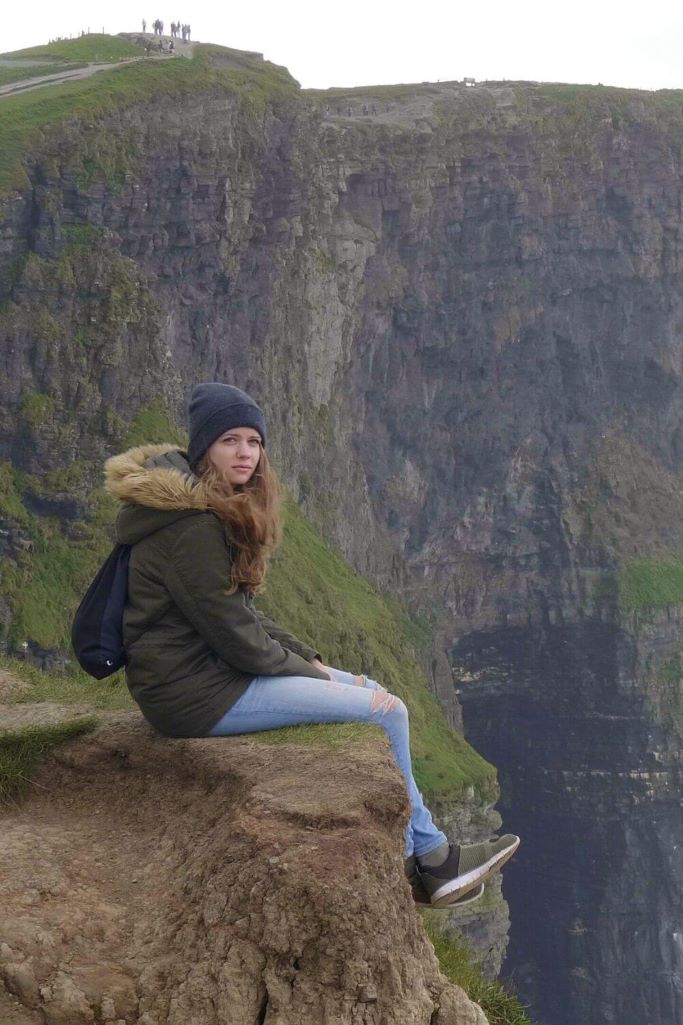
If you already have a winter coat or jacket but are unsure if it is waterproof, then add a packable rain jacket to your list, something you can slip into your day bag for Ireland.
Another good thing to bring with you is some waterproof over-trousers that you can slip on when out and about and the rain starts. These usually pack down small and can be the difference between dry pants while sightseeing and exploring, or wet legs and bums!
Another must for your packing list for Ireland in January is waterproof boots or hiking shoes. With frequent rain, wet feet are a big possibility while exploring the natural landmarks of Ireland and other famous sites such as the Rock of Cashel or the Cliffs of Moher.
Personally, I have a pair of waterproof Merrell women’s hiking shoes, Merrell Women’s Alverstone Shoe, which I always bring to Ireland, no matter the season. They are comfortable to wear and keep my feet dry.
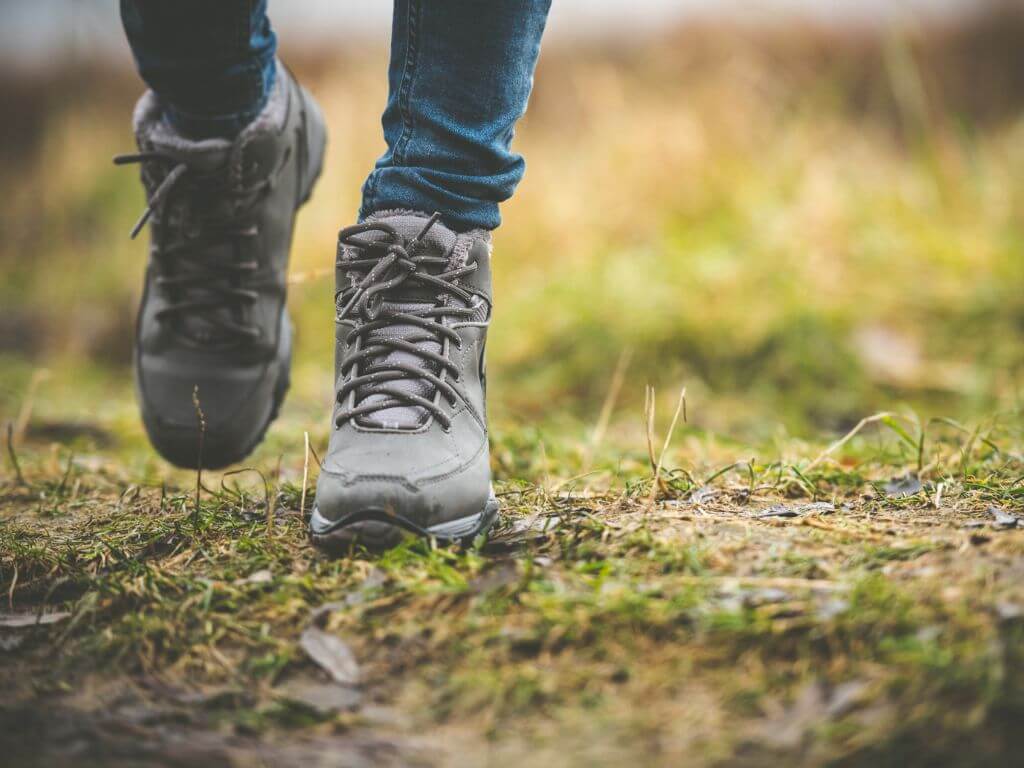
And finally, a good addition to your day bag would be a windproof umbrella. With wet and windy days common during January, an umbrella that won’t blow away with the wind to use while going from your car/transport indoors would be useful.
Clothing essentials
As already mentioned, the aim of your packing list for January in Ireland is warmth and remaining dry. Since we’ve covered dry above, let’s look to warmth now.
Layering is ideal as you will find indoor places such as shops, museums, and restaurants warm compared to outside. So being able to remove layers easily is advised. Here is a concise list of clothing that each member of your travel party will need.
Hat, gloves and scarf – To help keep warm outside.
Fleece tops – These are ideal elements for a layering system. They are lightweight, versatile, and warm.
Wool sweater – Whether you opt to bring one with you or buy your wool sweater in Ireland as an Irish souvenir, a wool sweater is a good addition to your winter clothing for Ireland. If you are going to buy your sweater in Ireland, make sure to buy it early in your trip so you can weather it for the rest of your trip.
Flannel shirt – These can be useful daytime tops for both men and women and can easily be teamed with fleece tops or a woolen sweater.
T-shirts – Make sure to pack a few t-shirts, either short or long-sleeved, whichever is your preference.
Jeans – Jeans are a staple to any Irish wardrobe and can be worn anywhere and any time of the day or night. Pair them with a flannel shirt and sweater for daytime and with a less casual top for evening wear.
Technical pants – When shopping for these types of pants for packing for Ireland, opt for water-resistant versions that dry quickly. They are a great alternative to jeans, especially for outside the cities where you are more likely to be hiking or exploring outdoors. Lined technical pants are best for winter in Ireland.
Wool socks – A few pairs of wool socks are advisable for your packing list. These will keep your feet warm while wicking away moisture.
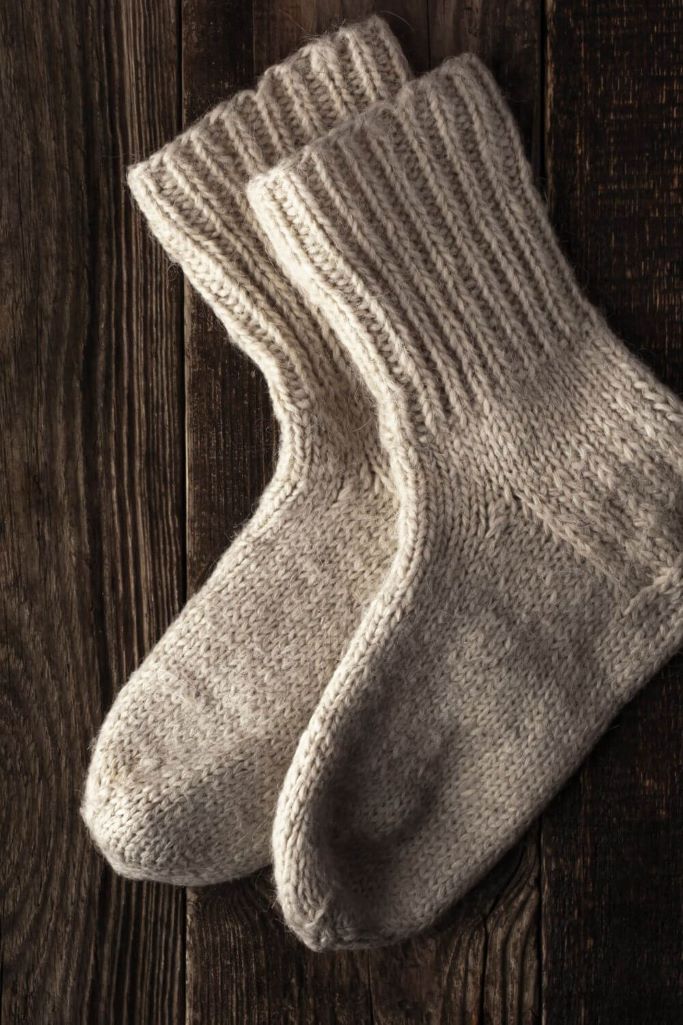
Base layers – Depending on how much the cold affects you, a set of base layers for particularly cold days might be worth packing. I and my son have used base layers in Ireland during a trip in March and April as we were coming from a warmer climate. They kept us nice and warm, even when the wind was bitingly cold.
Long sleeve cardigan – A long sleeve cardigan for ladies would be great for evenings in restaurants or your hotel bar for keeping chills off you.
Fleece-lined leggings – If you don’t fancy wearing jeans or need to save some space in your luggage, then fleece-lined leggings for women can be a great option. They’ll keep your legs warm and are versatile enough to wear with shirts or even short dresses.
Evening shirt – For men, an evening shirt or dress shirt might be advisable for restaurants, particularly if you are staying in one of the top luxury hotels in Ireland where the restaurants may have a dress code. An evening shirt or top for ladies is also advisable.
Chinos – For men, chinos are a better alternative to jeans for evening wear.
Winter dress – For ladies, one or two winter dresses are great choices for evening wear. Combine with your fleece-lined leggings or a warm pair of tights and you are all set for dinner.
Loafers – For evening wear for men, a pair of loafers that can be worn with your choice of chinos are the ideal footwear for after a day of sightseeing. You won’t want to be wearing your waterproof boots if you are going from your hotel room to the restaurant.
Black flat shoes – For the ladies, a pair of black flats are ideal with either jeans or a dress. They pack small and usually don’t weigh too much either.
Flip flops – These can be useful in your accommodation for wearing in your room, down to breakfast, and even at the hotel pool or spa.
Packing cubes – I’m pretty sure you know this by now, but if not, packing cubes are the best way to pack for any trip. Roll your items up tight, pop them into colour coordinated packing cubes per person and use them to store your clothing in drawers straight from the bag.
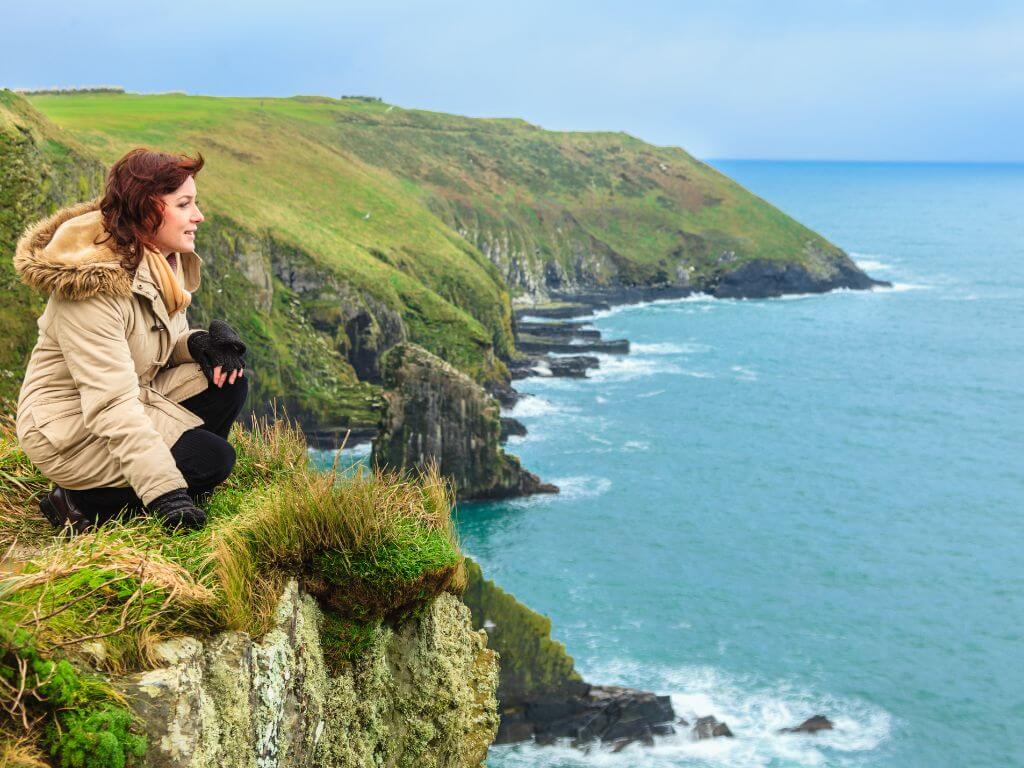
Packing for Ireland in January – Essentials
Now that your clothing packing list for Ireland is done, it is time to turn to other essentials for Ireland. These include your travel essentials, and electrical items and gadgets.
Travel essentials
Passports – You need to ensure your passport is in date and for certain countries, that it is valid for 6 months from the time of your visit. Find more information here.

Visas – Visitors from certain countries require a visa to enter Ireland. Click this link to find out if you need a visa to enter Ireland.
Driving license and IDP – Don’t forget your driving license and International Driving Permit (if required by the car hire company). Each individual car hire company has different requirements regarding IDPs. Those from the EU and UK generally do not need an IDP but check before you go to Ireland whether you need one or not.
Credit/Debit cards – Make sure you have a valid credit card with sufficient credit available to cover your excess on your car insurance if you are hiring a car and deciding not to take out Super Collision Damage Waiver with the car hire company. Some will not access third-party SCDW policies and will still look to cover the access on a credit card. Your credit card will also be handy for those souvenir purchases. And remember your debit card for taking money out of an ATM.
Travel Insurance – Do not travel to Ireland without travel insurance. Even if you think you don’t need it, you never know when an accident or flight cancellation might occur, and it is much better to have peace of mind than a headache of worry. You can get a free quote from SafetyWing (for longer travel) or World Nomads for adventure travellers and general travel.
SafetyWing – Ideal for digital nomads and long-term travellers.
Travel document holder – A travel document holder or wallet is great for keeping passports, visas and all your hotel and tour bookings in one place.
Daypack – A waterproof daypack is another good thing to remember for your Ireland packing list for January. A waterproof one will ensure the personal items you carry with you remain dry, even if you get caught in a downpour. The Outlander Lightweight Travel Daypack is an ideal daypack for Ireland.
Guidebook – If you plan to be spontaneous, or have decided not to plan your entire itinerary, then an Ireland travel guidebook will be a useful addition to your packing list.
I recommend the Lonely Planet Guide Book for Ireland. I have used Lonely Planet for years and have their 13th edition for Ireland and still refer to it for our own trips.
Travel Towel – It is always a good idea to take a travel towel with you. Sometimes you just need a little bit more help than the towels provided. Or, it can be left in the trunk of your hire car for days when you might get caught out in the rain.
Travel Pillow – For flights, bus trips, train journeys and long car rides, a travel pillow will make it more comfortable for travellers.
Reusable tote – Ireland has long given up giving out plastic bags for purchases. Nowadays, retailers provide paper bags. However, if you are shopping on a rainy day in Ireland, paper bags may disintegrate. So, to avoid this happening, take a reusable tote bag with you to pop your purchases into.
Electrical items and gadgets
Universal travel adapter – You cannot travel to Ireland without a universal travel adapter. Ensure you choose one that will accommodate your plugs and one that has some USB ports.
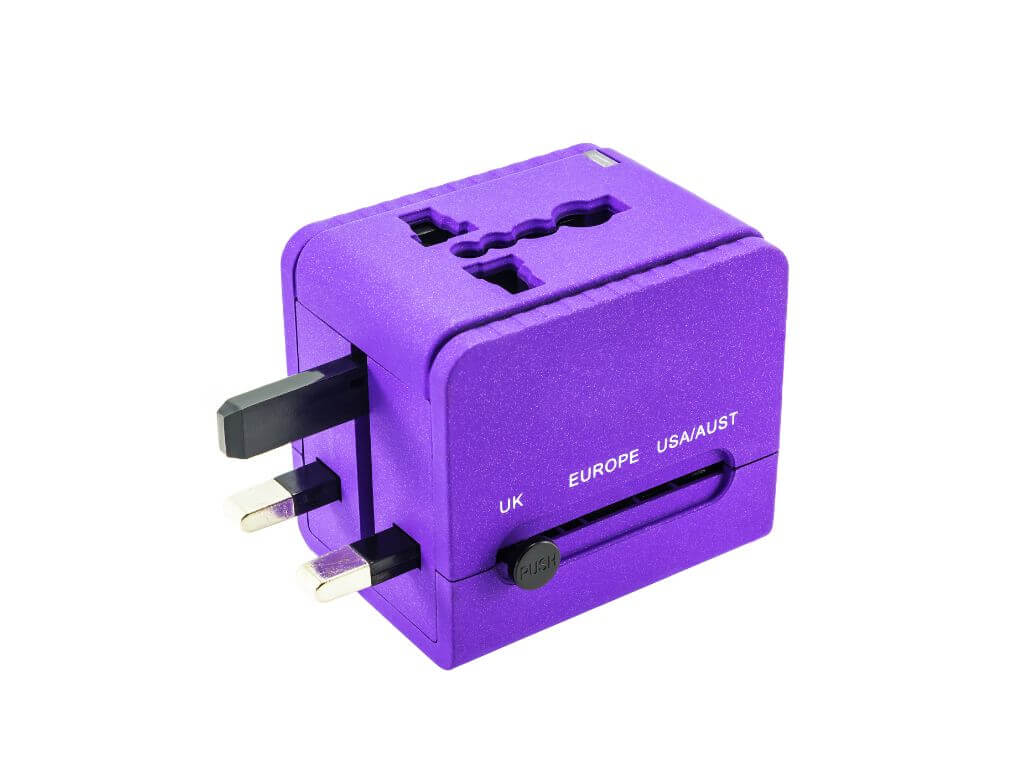
Portable phone charger – If you plan on using your phone to take all your photos, ensure you have a portable phone charger with you, just in case your battery starts to run low. The best portable power bank on the market comes from Anker. These are our power banks of choice and they have never let us down.
Kindle Paperwhite – Instead of carrying around heavy physical books, opt for a Kindle Paperwhite instead. We never travel anywhere without ours and you can even get digital versions of some guidebooks for Kindle.
Camera batteries/memory cards – If you are bringing a separate camera with you to capture your pictures of Ireland, then ensure you pack enough batteries, chargers, and memory cards for your camera. You don’t want to run out of power or memory just as you find the perfect spot to capture a sunset over the Cliffs of Moher or sunrise at the Giant’s Causeway!
Reusable water bottle – Pack a collapsible water bottle to refill when you can. These are far more eco-friendly than buying water bottles everywhere you go. And yes, tap water is safe to drink in Ireland.
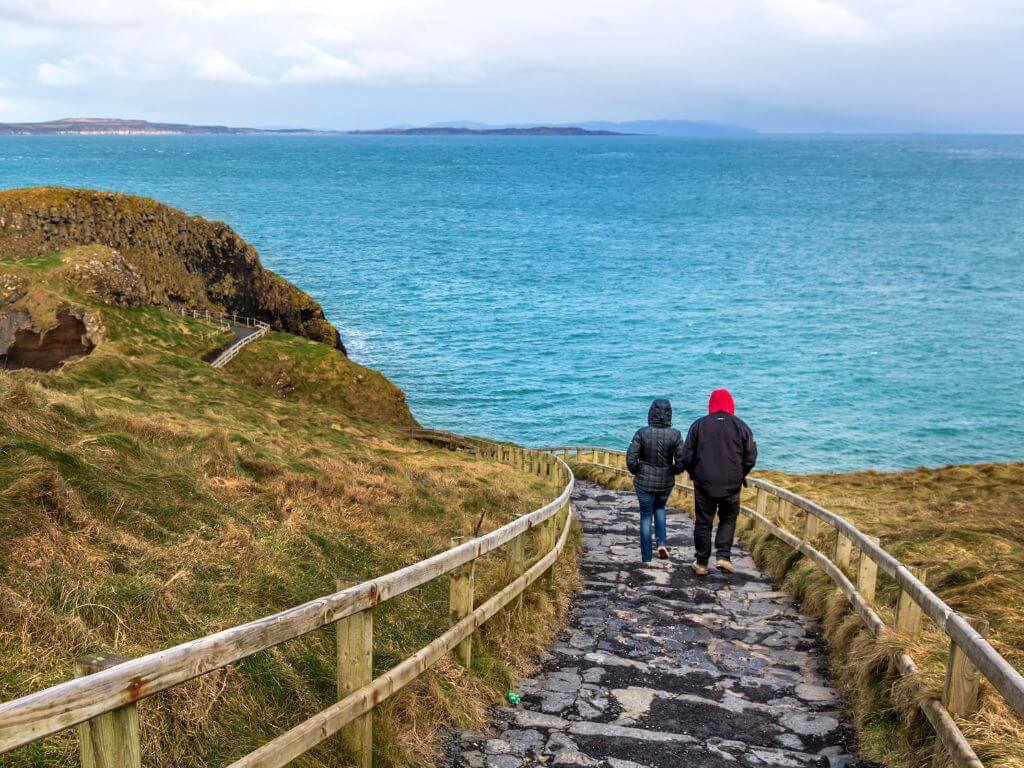
What to pack for Ireland in January – Toiletries
With all your clothing and essentials sorted, you need to think about toiletries. There are two things to consider here.
Firstly, are you going with hand luggage only? If so, you need to ensure your liquids and creams do not exceed hand luggage limits and are no more than 100ml.
Secondly, if you are taking hold luggage, try not to use up your space and weight allowance with full-size bottles. You can buy toiletries in any pharmacy, beauty store and supermarkets throughout Ireland. Just pack what you need for your first few days and top up when you need to.
Remember to pack the following:
- Shampoo/conditioner
- Body wash
- Toothbrush/toothpaste/mouthwash
- Deodorant
- Razor (check whether you can carry a razor in your hand luggage before your departure)
- Shaving gel
- Hairbrush
- Hair ties
- Lip balm (the wind in Ireland in January can be very drying)
- Hand warmers (if you think you will need them)
- Women’s sanitary products
Also, remember to pack any specific pain medication you might need and any regular prescription medication you take. And take more than you need. Most prescription medication can only be purchased in a pharmacy in Ireland with a doctor’s prescription note. It is also a good idea to bring a copy of your latest prescription note from your doctor, just in case you need medical attention or to see a doctor. They at least can then see what your own doctor prescribes.
There is also a limit on the quantity of pain medication such as paracetamol and ibuprofen that you can buy over-the-counter in one transaction. And no, they won’t split them between you and your husband if they know you are together, as myself and my husband discovered recently. The same goes for medication such as antihistamines for allergies!
Store all your toiletries and medication in a hanging toiletry bag. Bathrooms in guesthouses and traditional B’n’B’s can be small with little space for a roll-out bag.
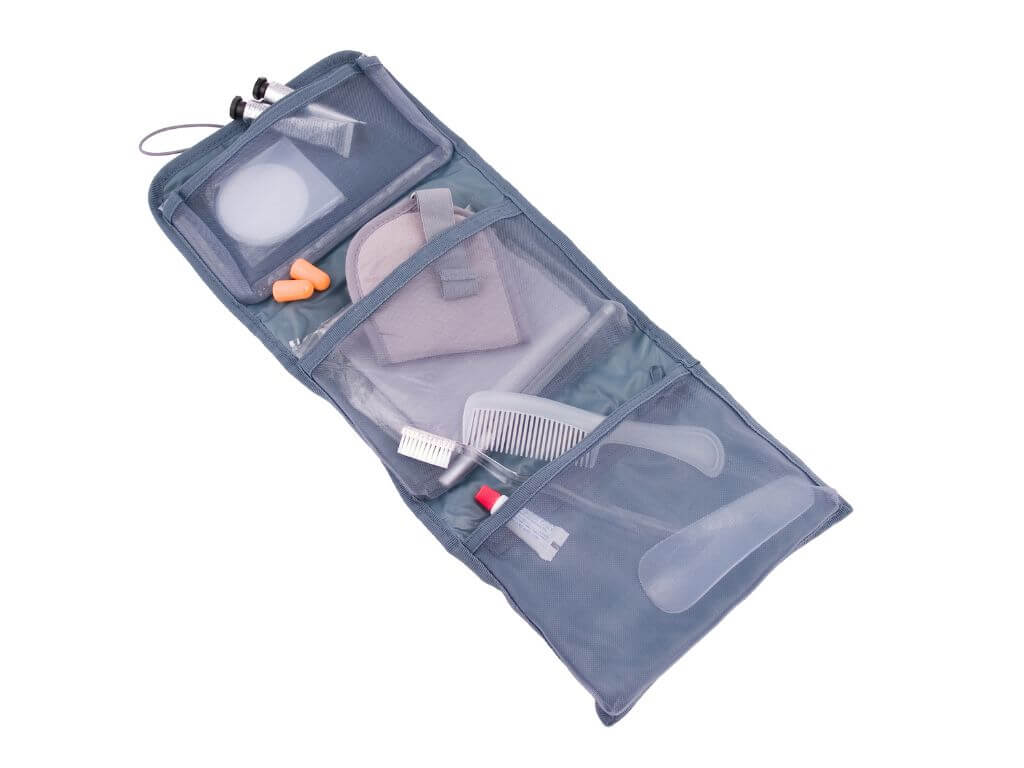
Things not to forget when packing for visiting Ireland in January
Sunglasses – Even though you are visiting Ireland in January, you may regret not taking a set of sunglasses. The winter sun sits low on the horizon and driving at sunrise eastwards, or westwards at sunset can mean the harsh sunlight is shining right in your eyes. So, pop your favourite pair in your bag.
Sleep Eye Mask – A sleep mask is a good idea for your plane journeys. And, if you plan on having a lie-in on any day of your trip, bring a sleep eye mask as not all hotels and accommodation choices have blackout blinds or curtains.
Earplugs – Some hotels can be noisy, especially if they are located in the centre of a town or city. So, if you are a light sleeper, pack some earplugs. Personally, the best ones I’ve found are Mighty Earplugs. They mold to the shape of your ear and are super comfortable.
Now that you know what to pack for January you will be well prepared to face whatever the weather throws at you and all eventualities.
You might also be interested in these articles:
- Visiting Ireland in January
- The Ultimate Ireland Packing List
- Essentials You Need to Bring to Ireland
- What to Wear in Ireland
- A Complete Guide to Getting Around the Emerald Isle
- A Helpful Guide to Navigating Ireland Without a Car
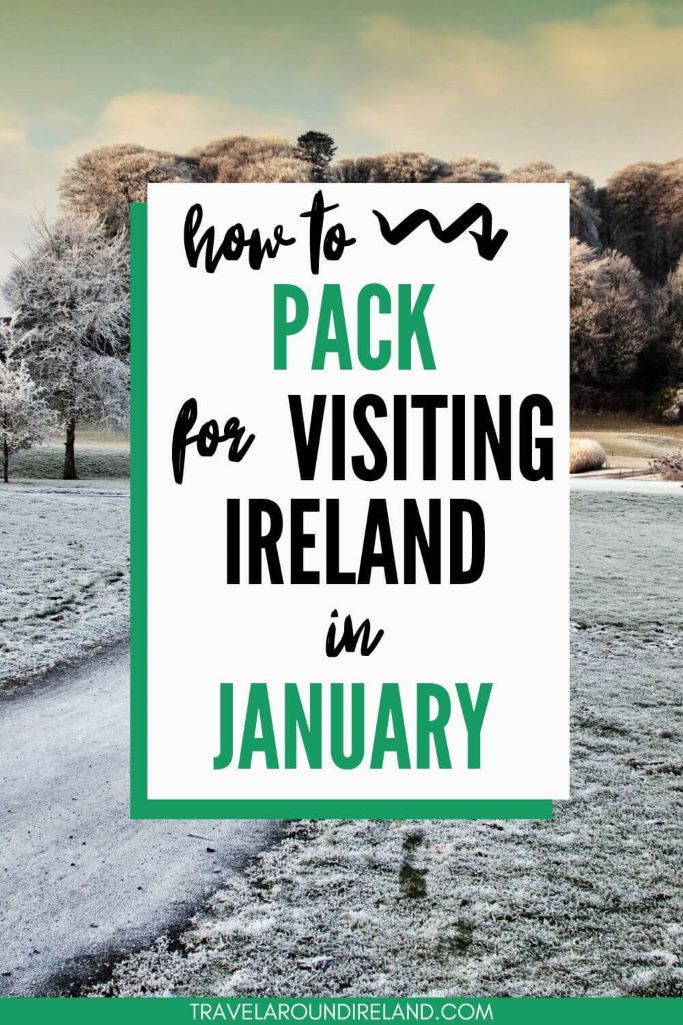
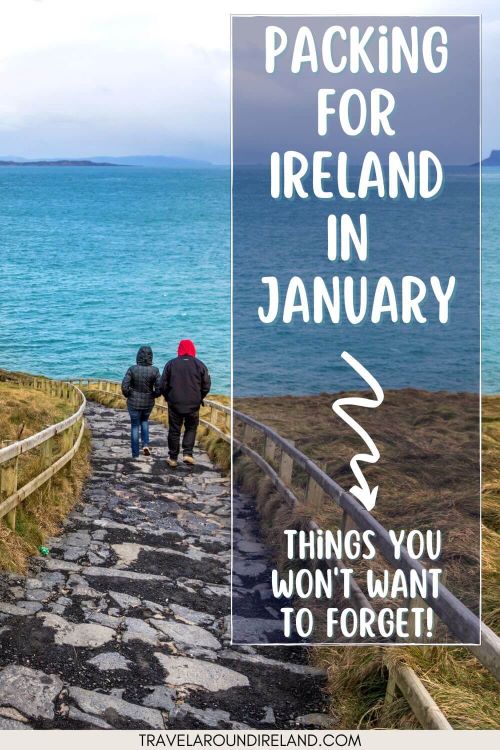
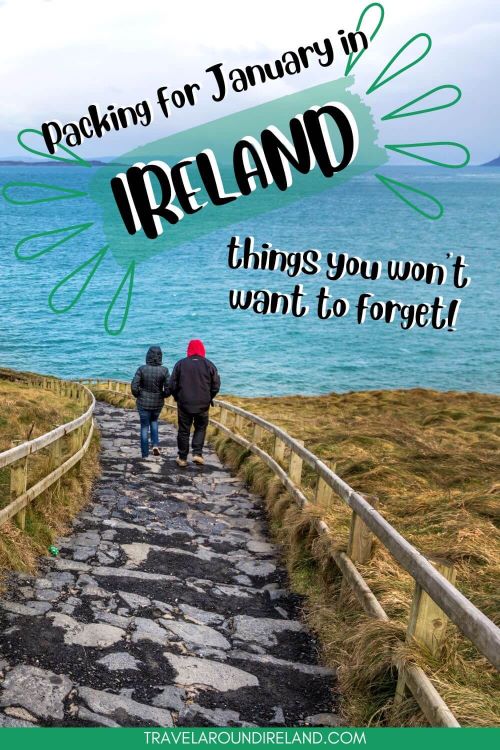
Travel Around Ireland is a participant in the Amazon Services LLC Associates Program, an affiliate advertising program designed to provide a means for sites to earn advertising fees by advertising and linking to amazon.com, amazon.co.uk, amazon.ca. Amazon and the Amazon logo are trademarks of Amazon.com, Inc. or its affiliates. To learn more about affiliate links, read my Disclosure Policy here.
